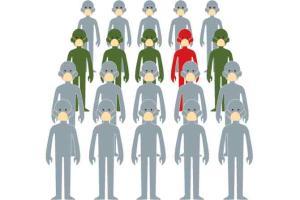
Graphic/ Uday Mohite
I was initially assigned to the COVID ward [at a Mahim-based hospital] and served there for a month. I was then moved to the regular ICU and told that if needed, I'd be called to the COVID ICU. In the meanwhile, I was on night duty," says a 24-year-old healthcare worker, who requested that we not identify her for this article. On the third night of the duty, she started feeling ill and by the fourth night, she had a running nose, headache, body ache and couldn't sleep. A test on May 14, results of which came the next day, confirmed that she had tested positive for the novel Coronavirus. After initial treatment at a Dadar centre, she was sent home for quarantine and resumed work in June. While she no longer had symptoms, the weakness continued. The worst was still not over.
ADVERTISEMENT
Again, while on night duty on July 5, her fever spiked. "It was so sudden. I had just received a patient in the ICU and my temperature registered at 37.7 C [99.86 F]. I took the elevator to the casualty ward and they wanted to check my temperature again. They insisted as I was 'warm'. And I registered 100.4 F." Shivering and with body ache, she popped an analgesic for it. After all, it couldn't be COVID. She had just recovered from the infection and knew that "a recurrence doesn't occur".

A boy understands the safety of a mask while playing on a balcony on the festival of Raksha Bandhan last week in Mumbai. PIC/GETTY IMAGES
She says she didn't get tested for COVID for a few days. "But the fever didn't go the next day either. On July 7, I got tested for malaria and dengue. Both tests returned negative. Then the tests for COVID and leptospirosis came positive." However, the leptospirosis test she attributes to a previous infection. All the symptoms were pointing to a second bout of COVID.
Discharged from the hospital after a seven-day treatment, she is now recuperating at home.
Her case and its details have now been put together in a paper which has been submitted to the International Journal of Tubercolosis and Lung Disease, and is currently under review. The paper, written by Dr Lancelot Pinto, Dr Viral Nanda, Dr Ayesha Sunavala and Dr Camilla Rodrigues, states, "we are now faced with the possibility of a gradual waning of immunity post-infection, and consequently, possible reinfections."
The healthcare worker isn't the only one to have reported a second infection. Reinfections have been reported across the world, and closer home in Delhi, too.

Nashville photographer Carter Wright tested positive again on July 11 four months after recovering from the infection. He says he still sees black floaters in his eyes. CREDIT/INSTAGRAM
Nashville photographer Carter Wright announced on his Instagram handle on July 11: "I have Corona. Again." Nearly four months after recovering from COVID-19, Wright is battling the virus for a second time. When the novel Coronavirus hit the US in March, Wright was "naively" travelling in New York City with a bunch of friends. He was there when the Broadway shut down. Soon after returning home, he started developing flu-like symptoms and a sore throat. Eventually, his cough worsened and he got approved for a COVID-19 test. The result was positive. "Overall, it was like a mild flu. It still sucked and I felt awful and the mental toll of having a disease that literally everyone in the world is talking about how it can kill you, is hard to describe. I wouldn't wish it on anyone," he says in a social media post.
But he fought it, and eventually recovered. While he presumed he had become immune to the infection, he continued to take precautions and wore a mask in public. On July 4, he reported a sore throat and the next day, he tested negative for strep throat and COVID-19. But when his temperature reached 101.2 F, he went to the hospital. After several tests, including one for the virus, he tested positive again.
On July 23, a Delhi police official tested positive for COVID-19, after recovering from the disease two months ago. The 50-year-old had first tested positive in May and was treated at the Indraprastha Apollo Hospital between May 15 and 22. Thereafter, he had tested negative and resumed duty. However, on July 10, he again felt unwell with a fever and dry cough and took a test three days later.
Global research into the pandemic, which at seven months, is still at a nascent stage has suggested that immunity to the virus may be shortlived. A study published on the pre-print server medRxiv—which means that the study has not been peer reviewed yet—suggested that the levels of antibodies people produce in response to COVID-19 infection rapidly decline after they hit their peak. In her report on the paper, Yasmin Tayag, a senior editor at Medium, writes: "In the medRxiv study, King's College London researchers repeatedly tested the antibody levels of 96 people who tested positive for COVID-19 between March and June. They observed that while 60 per cent of people had a 'potent' antibody response around 23 days after their symptoms first appeared, only 16.7 per cent of them still had the same level of potency an average of 65 days later. They also found that people who had more severe infections tended to have more and longer-lasting antibodies than people with milder cases."
.jpg)
Dr Lancelot Pinto, consultant respirologist at PD Hinduja Hospital
Explaining how post-infection immunity works, Dr Pinto, consultant respirologist at PD Hinduja Hospital, says it could be either through antibodies (Y-shaped proteins that latch on to the infection and signal the immune system to get to work) or through cell-mediated immunity in which the cells in the blood retain a memory of the infection and thus are able to fight it back. While antibodies have been known to fall drastically in some diseases, Dr Pinto says, for instance, in the case of H1N1, patients retain cell mediated immunity for a long time. "The Oxford vaccine trial has measured both the anitbody immunity as well as the cell immunity," he adds. However, the healthcare worker tested negative for antibodies when a test was conducted on her on July 25. The hospital laboratory is not equipped to test for cell-mediated immunity.
There have been arguments that cases of reinfection could actually only be cases of reactivation of the virus i.e. the virus has been present all along in the body and has become 'alive' again. Each virus, Dr Pinto explains, has its own unique RNA, which if tested can explain whether an infection is a new one, or a remnant of an old one.
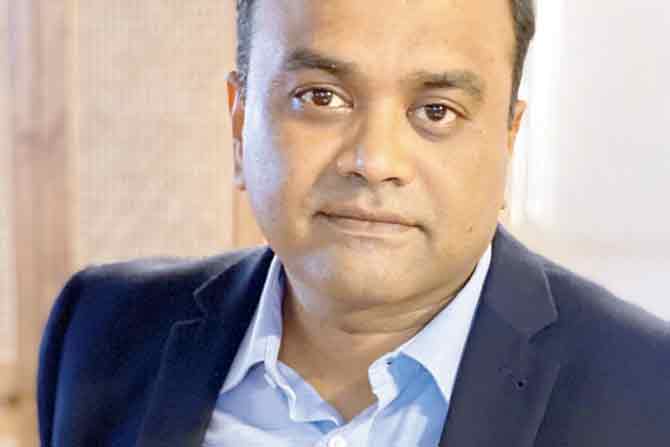
Giridhara Babu, professor of epidemiology with the Public Health Foundation of India
Bengaluru-based Giridhara R Babu, professor and head, Life Course Epidemiology at the Public Health Foundation of India, says, "There are a lot of RNA remnants of Coronavirus that stay in the body of the patient. This is why some people tend to test positive again after recovery. A mere positive test for the second time does not indicate reinfection."
Dr Shashikiran Umakanth, head of department of medicine, at Dr T M A Pai Hospital in Udupi, says, "The RT-PCR test we do for COVID-19 has a sensitivity of 85 per cent. That means 15 per cent of the times it might be wrong. And, I am actually overestimating here, as most labs say the test is only 60 per cent efficient."
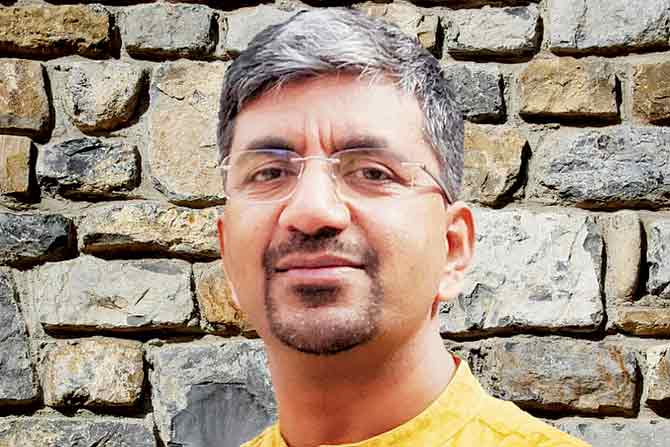
Dr Shashikiran Umakanth, professor and head, department of medicine at Dr TMA Pai Hospital, Udupi
He adds that a positive on the RT-PCR test may not be indicative of a new infection. "Seven days after a person contracts the virus, the test shows positive. But the person is no longer infectious. At this point, the virus is being shed by the body through oral and nasal cavities, but is a dead/inactive virus. The only way to confirm is through a culture test, where you put it [virus] in a growth medium and see if it replicates. If it doesn't, it is considered a dead virus. So, while an RT-PCR can show positive test by the 10th day, a culture test may show negative. This is why we say that chances of reinfection are very low," Dr Shashikiran says.
Babu says the numbers would have given evidence. "Since Mumbai saw the first wave of COVID-19 much earlier, we should have seen more cases of reinfection by now. Statistically, the number would have been higher. But nothing of that sort has happened. Exceptions don't prove the rule," he adds.
Dr Pinto, and the doctors at Hinduja Hospital agree that a mere second positive doesn't confirm a reinfection. They have sent samples of the healthcare worker's RNA sequences to the Faridabad-based Translational Health Sciences and Technology Institute (THSTI) for testing. Results are expected later this month.
They have stated in their paper that milder strains of Coronaviruses (pre-2019 strains) have been known to have short-lasting protective immunity post-infection, leading to reinfection. The paper refers to the collaborative study COvid RECurrences conducted across multiple centers in France which identified 11 patients between April 6, 2020 and May 14, 2020, who had possible re-infections. In these cases however, the symptom-free interval—nine days for four healthcare workers with mild symptoms, 11 days for moderately affected—was shorter, making the possibility of 'viral reactivation' feasible. Their patient, in contrast, had a symptom-free period of close to six weeks, "which would make such a reactivation less likely."
What does this imply?
For Mumbai, which has been heaving a sigh of relief with cases dipping below 1,000 now and then for a few weeks, it means 'don't let your guard down'.
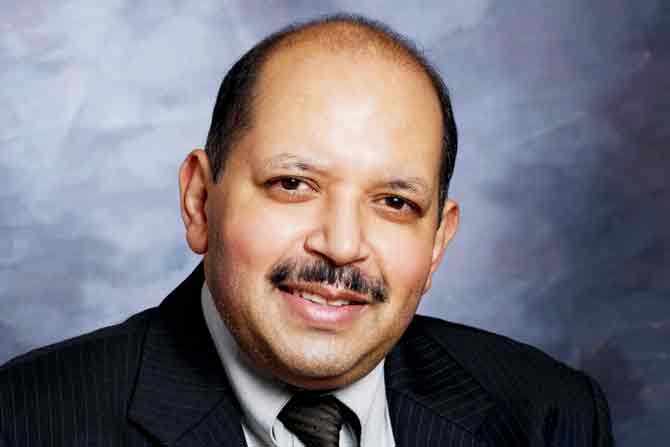
Dr Om Srivastava, head of Jaslok Hospital’s Infectious Diseases Department
Dr Om Srivastava, head of Jaslok Hospital's Infectious Diseases Department, says he has been seeing a couple of cases each week of reinfection or reactivation with a gap of anywhere between two weeks and two months. "We have known the virus only for seven months. No one can claim they know how it behaves. Certainly, I can't. All we know for now is the lung involvement in the first seven to 10 days. But what are the infection's prolonged effects? We will find that out in three to five years, that's when we will get some semblance of how this virus functions."
He adds that herd immunity should not be banked upon as a means of protection. "One can't be sure how much protection this gives and for how long."
The Hinduja paper points out that preliminary findings from the first large seroprevalence study from Mumbai were reported on July 29, 2020: 57 per cent of those sampled in slums and 16 per cent of those sampled from buildings were found to have antibodies. The findings led to optimism that the city may soon achieve herd immunity. However, the doctors say, such optimism is hinged on the assumptions that such antibodies are protective against reinfection, that they will not wane with time or that, even if they do wane with time, "their being present at some point during the course of recovery from the illness might be reflective of a broader immune process that includes cell-mediated immunity", protecting individuals from re-infection.
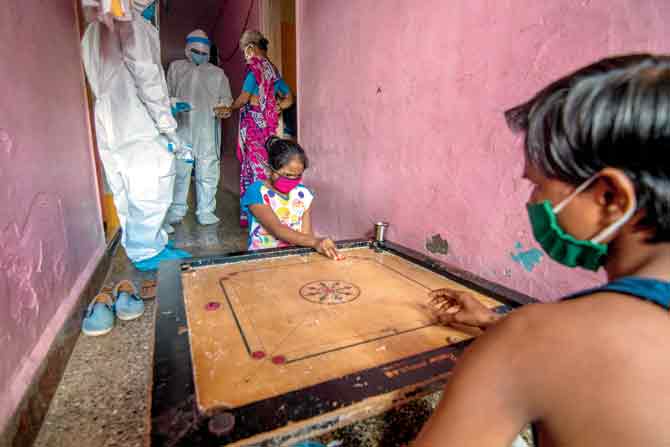
Residents of Chikuwadi, Mankhurd, play carrom using precautions while healthcare workers carry out temperature tests, last week. PIC/GETTY IMAGES
"The idea of 'immunity passports' are based on the same assumptions. Reinfections suggest that we may have to understand the immunology of COVID-19 disease better before such assumptions can be held to be true."
As Wright says in his Insta post: "So much is unknown about this virus. This is not a joke. This is not the flu. I have friends who still can't taste or smell after getting it. I have black floaters in my eye ever since I had it the first time. Even mild cases I believe can permanently affect people. Take this seriously. Wear a mask. Wash your hands. Don't go to that party."
Catch up on all the latest Mumbai news, crime news, current affairs, and a complete guide from food to things to do and events across Mumbai. Also download the new mid-day Android and iOS apps to get latest updates.
Mid-Day is now on Telegram. Click here to join our channel (@middayinfomedialtd) and stay updated with the latest news
 Subscribe today by clicking the link and stay updated with the latest news!" Click here!
Subscribe today by clicking the link and stay updated with the latest news!" Click here!






